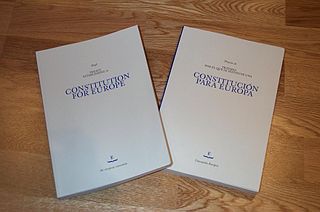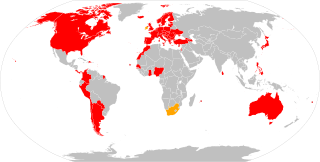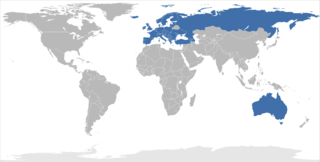
The European Convention on Human Rights is an international convention to protect human rights and political freedoms in Europe. Drafted in 1950 by the then newly formed Council of Europe, the convention entered into force on 3 September 1953. All Council of Europe member states are party to the Convention and new members are expected to ratify the convention at the earliest opportunity.

The Treaty establishing a Constitution for Europe was an unratified international treaty intended to create a consolidated constitution for the European Union (EU). It would have replaced the existing European Union treaties with a single text, given legal force to the Charter of Fundamental Rights, and expanded Qualified Majority Voting into policy areas which had previously been decided by unanimity among member states.
The Protocol to Prevent, Suppress and Punish Trafficking in Persons, Especially Women and Children is a protocol to the United Nations Convention against Transnational Organized Crime. It is one of the three Palermo protocols, the others being the Protocol against the Smuggling of Migrants by Land, Sea and Air and the Protocol against the Illicit Manufacturing of and Trafficking in Firearms.

The Convention on Road Traffic, commonly known as the Vienna Convention on Road Traffic, is an international treaty designed to facilitate international road traffic and to increase road safety by establishing standard traffic rules among the contracting parties. The convention was agreed upon at the United Nations Economic and Social Council's Conference on Road Traffic and concluded in Vienna on 8 November 1968. It came into force on 21 May 1977. This conference also produced the Convention on Road Signs and Signals. The Convention had amendments on 3 September 1993 and 28 March 2006. There is a European Agreement supplementing the Convention on Road Traffic (1968), which was concluded in Geneva on 1 May 1971.

International criminal law is a body of public international law designed to prohibit certain categories of conduct commonly viewed as serious atrocities and to make perpetrators of such conduct criminally accountable for their perpetration. The core crimes under international law are genocide, war crimes, crimes against humanity, and the crime of aggression. This article also discusses crimes against international law, which may not be part of the body of international criminal law.

The Brussels Regime is a set of rules regulating which courts have jurisdiction in legal disputes of a civil or commercial nature between individuals resident in different member states of the European Union (EU) and the European Free Trade Association (EFTA). It has detailed rules assigning jurisdiction for the dispute to be heard and governs the recognition and enforcement of foreign judgments.

An International Driving Permit (IDP), often referred to as an international driving licence, is a translation of a domestic driving licence that allows the holder to drive a private motor vehicle in any country or jurisdiction that recognises the document. The term International Driving Permit was first mentioned in the document prescribed in the International Convention relative to Motor Traffic that was signed at Paris in 1926, and is a translation of the French 'permis de conduire international', or 'international driving licence'. The Paris treaty, and all subsequent, use the word 'permit' exclusively in relation to all kinds of driving licence.

The Convention on Cybercrime, also known as the Budapest Convention on Cybercrime or the Budapest Convention, is the first international treaty seeking to address Internet and computer crime (cybercrime) by harmonizing national laws, improving investigative techniques, and increasing cooperation among nations. It was drawn up by the Council of Europe in Strasbourg, France, with the active participation of the Council of Europe's observer states Canada, Japan, Philippines, South Africa and the United States.

The Cape Town Convention on International Interests in Mobile Equipment, or Cape Town Treaty is an international treaty intended to standardize transactions involving movable property. The treaty creates international standards for registration of contracts of sale, security interests (liens), leases and conditional sales contracts, and various legal remedies for default in financing agreements, including repossession and the effect of particular states' bankruptcy laws.

Capital punishment in Armenia was a method of punishment that was implemented within Armenia's Criminal Code and Constitution until its eventual relinquishment in the 2003 modifications made to the Constitution. Capital punishment's origin in Armenia is unknown, yet it remained present in the Armenia Criminal Code of 1961, which was enforced and applied until 1999. Capital punishment was incorporated in Armenian legislation and effectuated for capital crimes, which were crimes that were classified to be punishable by death, this included: treason, espionage, first-degree murder, acts of terrorism and grave military crimes.
Additional Protocol to the Convention on Cybercrime, concerning the criminalisation of acts of a racist and xenophobic nature committed through computer systems is an additional protocol to the Council of Europe Convention on Cybercrime. This additional protocol was the subject of negotiations in late 2001 and early 2002. Final text of this protocol was adopted by the Council of Europe Committee of Ministers on 7 November 2002 by the United States Department of Justice by the United States Department of Justice under the title "Additional Protocol to the Convention on cybercrime, concerning the criminalisation of acts of a racist and xenophobic nature committed through computer systems, ("Protocol"). The Protocol opened on 28 January 2003 and entry into force is 1 March 2006. As of July 2017, 29 States have ratified the Protocol and a further 13 have signed the Protocol but have not yet followed with ratification.
International matrimonial law is an area of private international law. The area specifically deals with relations between spouses and former spouses on issues of marriage, divorce and child custody. In the last 50 years, the States Members of the Hague Conference on Private International Law have attempted to harmonize domestic matrimonial laws and judicial rulings across international borders in these areas.

The Council of Europe Convention on preventing and combating violence against women and domestic violence, better known as the Istanbul Convention, is a human rights treaty of the Council of Europe against violence against women and domestic violence which was opened for signature on 11 May 2011, in Istanbul, Turkey. The convention aims at prevention of violence, victim protection and to end the impunity of perpetrators. As of March 2019, it has been signed by 45 countries and the European Union. On 12 March 2012, Turkey became the first country to ratify the convention, followed by 34 other countries from 2013 to 2021. The Convention came into force on 1 August 2014. In 2021, Turkey became the first and only country to withdraw from the convention, after denouncing it on 20 March 2021. The convention ceased to be effective in Turkey on 1 July 2021, following its denunciation.

The Hague Convention on the International Recovery of Child Support and Other Forms of Family Maintenance, also referred to as the Hague Maintenance Convention or the Hague Child Support Convention is a multilateral treaty governing the enforcement of judicial decisions regarding child support extraterritorially. It is one of a number of conventions in the area of private international law of the Hague Conference on Private International Law in 2007. The convention is open to all states as well as to Regional Economic Integration Organizations as long as they are composed of sovereign states only and have sovereignty in the content of the convention. The convention entered into force on 1 January 2013 between Norway and Albania, with Bosnia-Herzegovina (2013), Ukraine (2013), the European Union, Montenegro (2017), United States (2017), Turkey (2017), Kazakhstan (2017), Brazil (2017), Honduras (2017), Belarus (2018), Guyana (2020), Nicaragua (2020), United Kingdom (2021), Serbia (2021) and New Zealand (2021) following suit. Because the EU acceptance of the convention applies in 27 EU countries, the convention applies in 42 countries worldwide.
The Convention on the Transfer of Sentenced Persons is an international treaty regulating the extradition and social rehabilitation of imprisoned persons. The Convention was concluded in Strasbourg on 21 March 1983 and entered into force on 1 July 1985. It has been ratified by 66 countries, including every country of the Council of Europe except Monaco. It has also been ratified by 19 states outside the Council of Europe, including Australia, Canada, Israel, Japan, South Korea, Mexico, the United States and India. The latest accession to the Convention was India in January 2018.

The Treaties of the European Union are a set of international treaties between the European Union (EU) member states which sets out the EU's constitutional basis. They establish the various EU institutions together with their remit, procedures and objectives. The EU can only act within the competences granted to it through these treaties and amendment to the treaties requires the agreement and ratification of every single signatory.

The Convention on Laundering, Search, Seizure and Confiscation of the Proceeds from Crime, also known as the Strasbourg Convention or CETS 141, is a Council of Europe convention which aims to facilitate international co-operation and mutual assistance in investigating crime and tracking down, seizing and confiscating the proceeds thereof. The Convention is intended to assist States in attaining a similar degree of efficiency even in the absence of full legislative harmony.
Human rights in the Kingdom of Denmark are protected by the state's Constitution of the Realm (Danmarks Riges Grundlov); applying equally in Denmark proper, Greenland and the Faroe Islands, and through the ratification of international human rights treaties. Denmark has held a significant role in the adoption of both the European Convention on Human Rights and in the establishment of the European Court of Human Rights (ECHR). In 1987, the Kingdom Parliament (Folketinget) established a national human rights institution, the Danish Centre of Human Rights, now the Danish Institute for Human Rights.
 Albania
Albania  Austria
Austria  Belgium
Belgium  Bulgaria
Bulgaria  Cyprus
Cyprus  Denmark (extended to the Faroe Islands, but not to Greenland)
Denmark (extended to the Faroe Islands, but not to Greenland) Estonia
Estonia  Georgia
Georgia  Iceland
Iceland  Latvia
Latvia  Lithuania
Lithuania  Moldova
Moldova  Montenegro
Montenegro  Netherlands (for the Kingdom in Europe only)
Netherlands (for the Kingdom in Europe only) Norway (extended to Bouvet Island, Peter I Island, and Queen Maud Land)
Norway (extended to Bouvet Island, Peter I Island, and Queen Maud Land) Romania
Romania  San Marino
San Marino  Serbia
Serbia  Slovenia
Slovenia  Spain
Spain  Sweden
Sweden  Turkey
Turkey  Ukraine
Ukraine 











